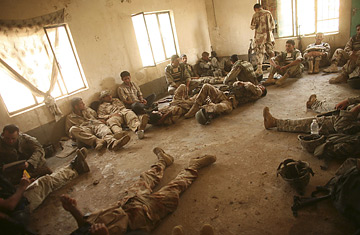
Exhausted soldiers try to get rest while on patrol in Iraq, May 2007.
A trial unfolding in a makeshift courthouse in a dusty corner of the U.S. Army's main Baghdad base camp complex is demonstrating in stark and dramatic terms just how far some American soldiers are being pushed on the battlefield, just how doggedly the Army is willing to pursue serious alleged crimes like murder — and just how interested the Iraqi government is in the process.
Part of an elite parachute infantry sniper-scout platoon, Sgt. Evan Vela is accused of murdering an unarmed Iraqi that his five-man squad had taken captive after the man breached their hideout. The squad was conducting a mission on May 11 last year near the city of Iskandariyah, which is 30 miles south of Baghdad and the southern-most point of Iraq's infamous "Triangle of Death." Vela is also accused of helping to plant an AK-47 on the body to make the kill look more justified. If found guilty of murder, he faces a maximum sentence of life in prison. Two other soldiers have already been tried on similar charges in the same death, as well as the deaths of two other Iraqis. In separate courts martial that took place in nearby Camp Victory late last year before juries comprised of officers and enlisted soldiers, the two soldiers were both acquitted of the murder charges but convicted of planting evidence on the bodies.
As the first day of testimony in what is expected to be a four day trial kicked off on Friday before an eight-person jury of both officers and enlisted soldiers, Vela's civilian defense attorney James Culp argued that his client was not guilty of murdering Genei Nesir Khudair Al-Janabi because, at the time Vela pulled the trigger, he was so sleep-deprived and dehydrated after four days of non-stop battlefield action that he was neither in control of his actions nor fully aware of what he was doing. "It was a terrible accident," Culp said outside the courtroom during a recess, "but Evan didn't intentionally shoot anyone."
On the witness stand, Sgt. Robert Redfern, another soldier on that patrol, described a combat schedule leading up to the shooting that tested the limits of human endurance. In great detail, he chronicled two back-to-back two-day missions that included nighttime hikes while carrying 150 lb. packs in what may be the most dangerous area of the country. During the day, the soldiers had no choice but to bake in the open sun in 120 degree heat as they tried to conserve the three or four liters of water per man they had carried in. And, since they were either traveling or conducting surveillance around the clock, no one was allowed to sleep more than 15 minutes at a time. "By the second day, I could barely stand," said Redfern. Some soldiers began administering hydrating IVs to each other just to stay mobile and fend off headaches. By sunup of the fourth day, the ailing group holed up in a hideout to try to get a few hours of uninterrupted sleep. Each soldier took a one hour guard roation while the others slept.
That's when Al-Janabi startled the group. There is conflicting testimony over who was supposed to be on guard at the time, but Sgt. Michael Hensley, the group's commanding officer, pinned the man down and searched him. Some time after that, Vela shot him in the head with a nine mm. pistol.
In his testimony today, Hensley, one of the soldiers already acquitted for his role in the death (but guilty of planting the AK-47), endeavored to justify the killing, saying that Al-Janabi would not stop yelling, crying and "flopping around like a fish" despite repeated efforts to silence him. It was then that Hensley says he decided, for the safety of his men, that Al-Janabi had to die. "I thought that he was trying alert insurgents," Hensley said. "I felt like I had no choice or we would be further compromised." He says he asked Vela, who had a pistol trained on the man, if he was ready, and then he told him to shoot. Vela pulled the trigger and the man died of that single bullet to the head. When asked why he didn't shoot Al-Janabi himself, Hensley said, "Vela happened to be the one with the pistol. I would have gladly shot him myself."
Iraq's Minister of Human Rights, Wijdan Mikhail Salim, however, does not see the case as either a justified kill or a horrific accident by an exhaustion-impaired soldier. She was attending today's proceedings, she told TIME, because, "I want to be sure that any American soldier who wrongs an Iraqi will go on trial. [Vela] killed an Iraqi man, an unarmed man. He must be punished."
Al-Janabi's son, who testified briefly in court today, is similarly looking for punishment. When asked in an interview outside of court what sentence he thought would be the minimum acceptable one, he answered through a translator, "Execution. But since I understand that execution is not possible in this case, it should at least be a life sentence."
Vela's family, however, believes the sergeant has become a political sacrifice to U.S.-Iraqi relations. According to Vela's father Curtis Carnahan, who, along with Vela's wife, flew to Baghdad to attend the trial, "My son's commanding generals want somebody to be guilty of something so they can appease their Iraqi counterparts. They have tried this killing two times already and have no murder convictions to show for it. I don't think my son did anything wrong and I am optimistic the jury will agree."
